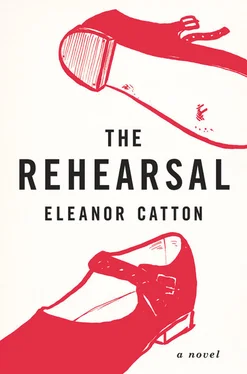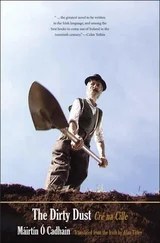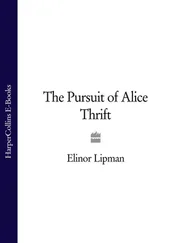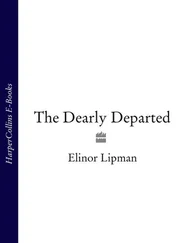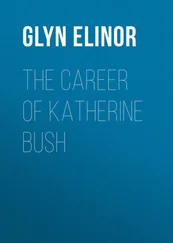“It’s horrible,” Stanley said.
The girl shot him a disdainful look, as if he couldn’t hope to understand. “Better than releasing it any other way,” she said. “Putting kittens in a microwave or whatever.”
“Is that what he’s doing? Releasing it?”
“Course,” the girl said, and tossed her head. “That’s her specialty. Head of Voice. People hire her out, outside the Institute—she goes to people’s private homes and stuff. It’s like a special type of therapy. She’s really good.”
They watched the boy howl for a while, thrashing stiffly with the dead weight of the Head of Voice clamped around him. His expression changed. He peeled his lips back so all his teeth were exposed and his nose was wrinkled in a snarl, and inside his mouth the hump of his tongue rose up, quivering and taut. He snapped his jaw and barked a little, short gasping barks from the back of his throat like a cough. The Head of Voice had begun crooning in his ear now, a gentle private lullaby that welled up underneath the frenzied barking and caused the boy to wither and gasp. Stanley felt suddenly ashamed.
“Come on. We should go,” he said, and tore his gaze away. The girl was already gone.
September
One Saturday afternoon in spring Stanley was huddled in a cubicle in the empty art department and trying without success to untangle the bobbin on his sewing machine. He was near finishing his Queen of Spades costume, sewing in a large waxy piece of cardboard behind the patterned front of the bust to give himself a more angular thrust. He had spent all morning struggling with the wire halo that fitted around his forehead. The headpiece was spangled with wire spokes designed to lift the geometric wimple higher off his head. After nearly five hours squinting at the seams and bruising his fingertips as he molded the rough end of the wire, he was finally satisfied that the effect was rather good. He was wearing the wimple now as he bent over the sewing machine, obscured to the rest of the room by a cluster of colonial furniture that had been carried to the art department for painting and left over the weekend to dry. All around him was the sweet smell of acrylic paint, as always at the Institute laced with detergent so the paint could be easily removed when the production closed.
Stanley bent over his costume. In his research for the production he had come to know his card very well: he knew that in the traditional French deck of cards the Queen of Spades was supposed to represent Joan of Arc, and in the game of Hearts the Queen of Spades was so unlucky she was known as the Black Bitch. He knew that she was the only queen to carry a scepter as well as a daisy flower, and for that reason she was sometimes called the Bedpost Queen. He had pored over the court cards in his deck at home for such a long time that he found the red-and-black images appearing after he closed his eyes at night. He disentangled the bobbin finally from the thready mess below the foot, and snipped the stray threads away. He pinched the end of the bobbin-thread in his fingers to pull it through the notch in the bobbin-holder, and heard the spool spin cleanly.
The door opened and Stanley caught a faint swell of music from the dance hall near the foyer, where a group of schoolchildren were taking their Saturday lessons in jazz.
“In here, then,” he heard somebody say, “Nobody should disturb us in here. It’s a bugger they’re using the staffroom. Sit down there if you like.”
The voice belonged to the Head of Movement. Stanley was still intently returning the bobbin to its tiny hinged cavity in the base of the sewing machine, a scrap of thread in his mouth, and he did not reveal himself at once. He wound the wheel at the side of the sewing machine and watched the needle plunge down to retrieve the bobbin-thread, bringing it up in a little scarlet loop that he flicked up with the tip of his scissors and tugged gently outward. He was so intent on the task that when it was done the Head of Movement and his guest were already in mid-conversation, speaking easily and with great relief, as two people who have longed for time alone to talk.
“They all want it,” the Head of Movement was saying. “Not just the first-years—everyone, right up until the day they leave.”
“Why doesn’t the school offer that sort of thing, then? One-on-one tutorials or whatever. If it’s what the students want.”
As slowly as he could, Stanley leaned sideways around the edge of his cubicle and saw, through the tiny sliver of view between an upended wing armchair and a sideboard, the central figure from the Theater of Cruelty exercise, the masked boy from second year who had slapped and shorn and nearly drowned his victim on the stage. Stanley watched him for a second, his smooth face unmasked now and taut with eager concentration as he listened to the Head of Movement speak.
“With you,” the Head of Movement was saying, “I think that this Institute will fall short in several respects. That’s what I wanted to say yesterday—I recommend something postgraduate, even an internship. The mime school. You’re going to be unfinished at the end of next year. Unfinished and hungry.”
The Head of Movement was speaking earnestly but without the clipped, rehearsed quality that usually characterized his speech. Stanley regarded the pair of them jealously through his sliver. The boy was sitting with his leg hiked up under him and his fingers stroking the frayed upholstery, nodding carefully as the Head of Movement spoke, and suddenly it struck Stanley what was so odd about the situation: they are friends , he thought in wonder.
“I value your opinion completely,” the unmasked boy said, leaning in close, and in that instant Stanley remembered the golden boy, greased and glittering like an artificial dish sprayed with lacquer to be photographed for a cuisine magazine. The golden boy had gleamed, and this boy was gleaming now.
Stanley swallowed and felt a bitter injustice in his throat. He recalled a vision of himself, in the Head of Movement’s office, pushing away tears as he shouted in complaint. Even now he felt a flicker of self-congratulation that he had responded to the Theater of Cruelty exercise in that violent way. Why hadn’t the Head of Movement been impressed, then? Why hadn’t the tutor relaxed into a rare and sudden intimacy, inspired by Stanley’s fragile openness to confess a vulnerability of his own? Why this boy, Stanley thought, this smooth-faced unmasked boy who was no better or worse than the rest of them?
“It’s funny,” the Head of Movement was saying now, “in many ways you’ve really… well. Woken me up, I suppose.”
“My growth is projected on to him… it is found in him ,” the unmasked boy quoted, and through his secret sliver Stanley saw both of them smile.
“Shared or double birth,” the Head of Movement said. “Not the instruction of a pupil but utter opening to another person.” He was silent a moment, and then he added, “Well remembered.”
They sat there and looked at their shoes, enjoying the shallow silence of the room. Behind the cold discolored flank of the sewing machine, Stanley watched and felt bitter. He waited two long hours, with cramp in both knees and a terrible hunger gnawing at his insides, until the boy and the Head of Movement finally ended their conversation and left the room.
July
“Let’s improvise it,” one of the first-year boys suggested. “Let’s start with what we had last week and see where that goes. I really liked what was happening with the two characters together, both of them saying things that the other doesn’t really hear, like neither of them is fully present for the other.”
“We’ll just start rolling,” one of the girls said. “First Mr. Saladin and then the girl, rotating like that. Anyone can get up at any time. Anyone can play either of them, doesn’t matter who. We’ll just try and keep the scene moving and see what happens.”
Читать дальше
